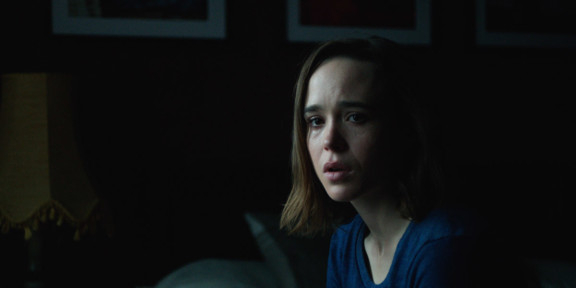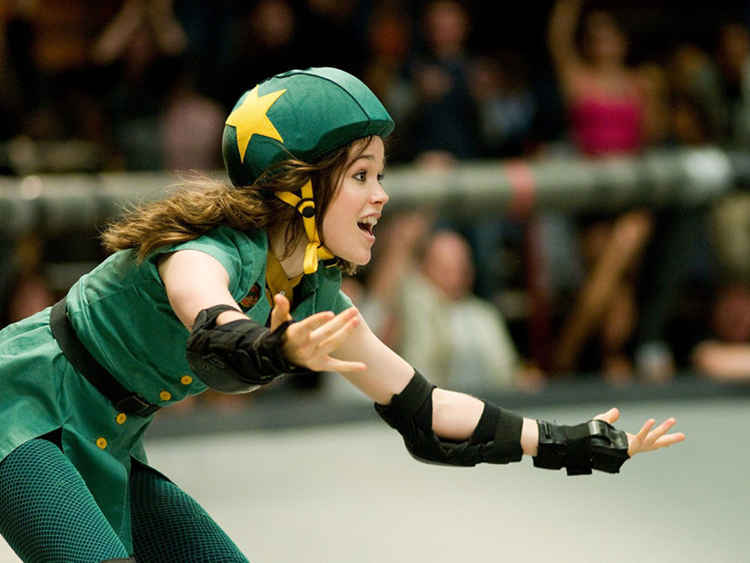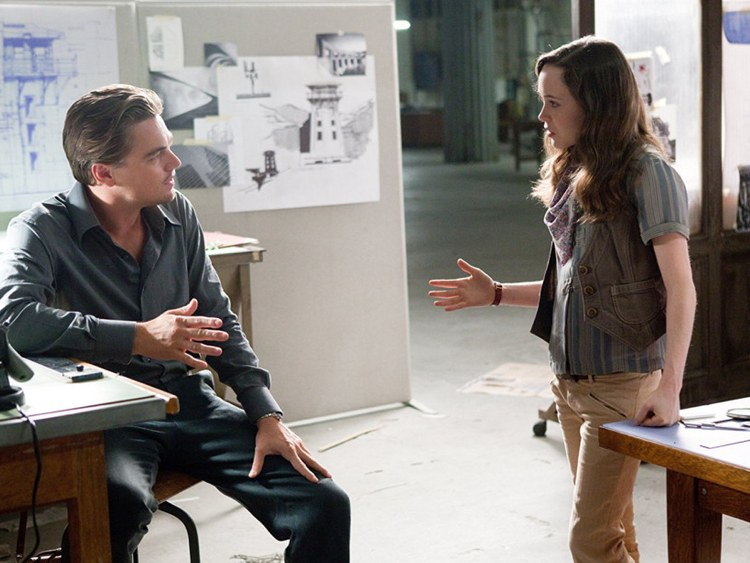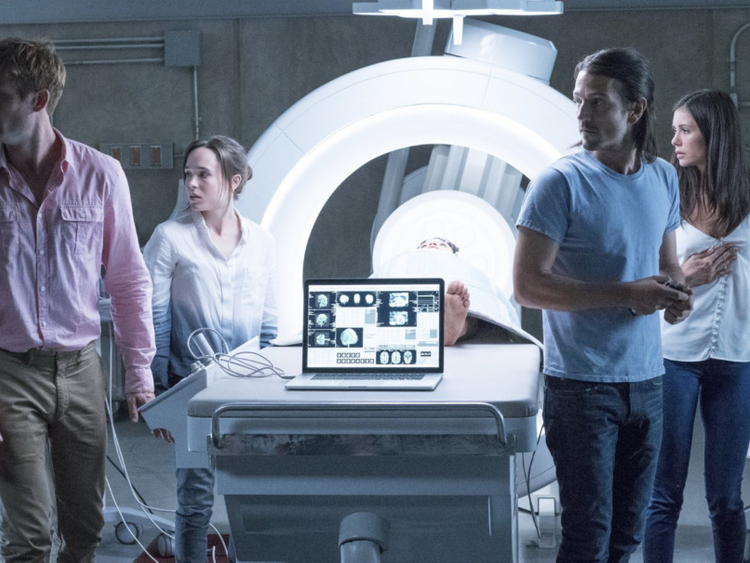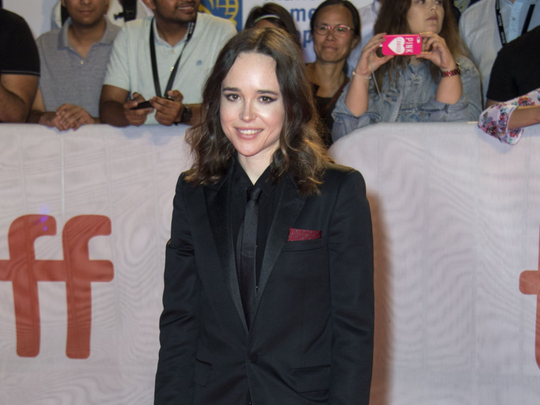
Half a lifetime ago, Ellen Page figured she had options if the acting thing didn’t go anywhere.
“When I was a teenager, I thought, ‘What if it doesn’t work out?’ I thought I was going to be a cinematographer,” said Page, whose career skyrocketed after her turn as a teenage mum in 2007’s Juno. “I was also obsessed with movie trailers. I was like, ‘I’ll make movie trailers.’”
Juno nabbed her an Oscar nomination at age 20, and now, almost exactly a decade later, Page is busier than ever.
This week, she toplines the slick studio remake of the 1990 thriller Flatliners, about a group of medical students toying with the boundary between life and death.
Earlier this month, she premiered two movies at the Toronto International Film Festival: the Irish zombie thriller The Cured and the romantic drama My Days of Mercy, about two women on opposite sides of the death-penalty debate who fall in love.
Sipping hot green tea on a brisk Toronto day, Page remarked on how nice it was to be back in the city where she moved from her native Halifax, Canada, to study at age 16.
“There were way fewer condos then,” Page laughed. “It was fun. It was back before smartphones. I was just this kid in ripped Converse, romping around the city.”
Soft-spoken, gracious and direct, she reflected on the course life has charted since those days, cracking the occasional mischievous smile.
“I’m getting old,” joked Page, one of the rare faces in Hollywood that never seems to age. “It’s interesting to look back. If I was to re-watch something like Hard Candy now, I’d be like, ‘[Look at] all this feminist conversation!’ At the time, I was just 17.”
Hard Candy, the 2005 thriller directed by David Slade starring Page as a Red Riding Hood-esque teen turning the tables on a sexual predator, marked the first time audiences had an inkling that a deeper, darker maturity lived within her 5-foot-1-inch frame.
Roles in big films and acclaimed indies followed as Page’s star rose. But something crucial was lacking in her career, despite successes like Juno, Whip It and Inception.
“In that time and the years following, I wasn’t necessarily that connected publicly to who I was,” said Page, who came out as gay in 2014. Being able to live authentically in her public life, she said, unmistakably affected the roles and projects she took on in her professional life.
“I think the biggest difference is feeling more able to be present in this, more able to enjoy, to feel at ease,” she said. “Exploring how that changes how you work, how it can deepen the work... I think now I do feel a little more solid, and more able to be present in this.”
Travelling the world to share LGBT voices in her Emmy-nominated Viceland documentary series Gaycation also deepened the connective tissue between her personal life and professional work.
“Meeting some of the most marginalised people you could meet and in different spaces all around the world, they’re sort of all dealing with the same things,” she said.
While she was filming Gaycation in India, the script for The Cured landed on her radar. Page was intrigued by the intensely emotional family drama in the guise of an apocalyptic zombie flick. She took on the role of Abbie, a journalist and mother to a young son wrestling with grief and forgiveness in a gritty contemporary Ireland where individuals rehabilitated after an outbreak of violent psychosis are reintroduced to society as pariahs.
“It moved me. It provoked thought and conversation,” Page said of the David Freyne-directed film, which IFC picked up out of Toronto. The Cured was filmed just after the presidential election last autumn, and real world anxieties became unintentionally prescient in the movie’s apocalyptic realism.
“It involves populist politics and fear-mongering, [people] utilising that fear for their own advantage, militarised police, lots of things that are going on,” said Page. “But to me, when you read a script — whether it’s genre or whether it’s two people in a house — and it’s good, and whole, and feels honest, it typically always has parallels to what’s going on and to current issues.”
Telling a wide range of LGBT stories is of particular priority to Page, who stars in and produced the romantic drama My Days of Mercy. In it, she plays a withdrawn anti-death penalty activist who enters a star-crossed romance with a woman on the other side of the political debate.
“We wanted to do a love story. That was something that we put out into the world,” said Page, who stars and produces with friend Kate Mara. “Blue is the Warmest Color had just come out, and we both adored it. I just want to play queer characters, to have those story lines and try and have a wider array of what those films can be.”
“We wanted to work together, because we love each other and we have a mutual respect for each other’s work,” echoed Mara. Producing the film themselves was a necessity, they note: Even for top-tier actresses, finding a project with a strong female lead role — let alone two — is still a rarity in Hollywood.
“It is very rare to find a film that stars three women, you have a female director and female producers,” said Mara, who with Page brought Christine Vachon of Killer Films onboard, tapped Tali Shalom Ezer to direct the screenplay by Joe Barton and recruited actress-director Amy Seimetz to play a crucial supporting role as Page’s sister.
“You get sent scripts all the time where the female character is not affecting the plot in any sort of shape or form, they’re just there to service a male narrative,” said Seimetz. “So it’s really lovely to get a script where you get a cool part or an interesting character, but it’s also all women, and women are driving the story forward.”
As wildly divergent as Page’s two latest indies are, both The Cured and My Days of Mercy have a common thread in her sensitive portrayals, characters processing grief, trauma and loss, fighting to reclaim their optimism in the face of the impossibly bleak worlds they live in. Perhaps surprisingly, Page sees her Flatliners character as occupying a similar emotional space.
“She’s had some trauma in her life, which I don’t think is a shock for a Flatliners movie,” smiled Page, who plays the ringleader of a group of med students experimenting with death in pursuit of answers beyond science. “I focused on this person being incredibly traumatised and pretty disassociated. She’s kind of manipulative. I liked exploring what it would mean to convince people to do this, and what would it take.”
Page considered what unites her three most recent screen characters: sadness. “To me, that’s one of the things that connects us the most as people,” she offered. “Profound sadness, or profound joy, in terms of watching art.”
She flashed to a recent film that moved her, one of her favourites. “Oh, my God, Rust and Bone made me fall to the ground and weep. Why do we strive for that feeling? I think it’s because it helps us, on some level. I think in all of these themes we’re talking about from each film, that’s the commonality in it for me.”
She paused and laughed. “That might say something about me.”
___
Don’t miss it!
Flatliners is currently showing in the UAE.



